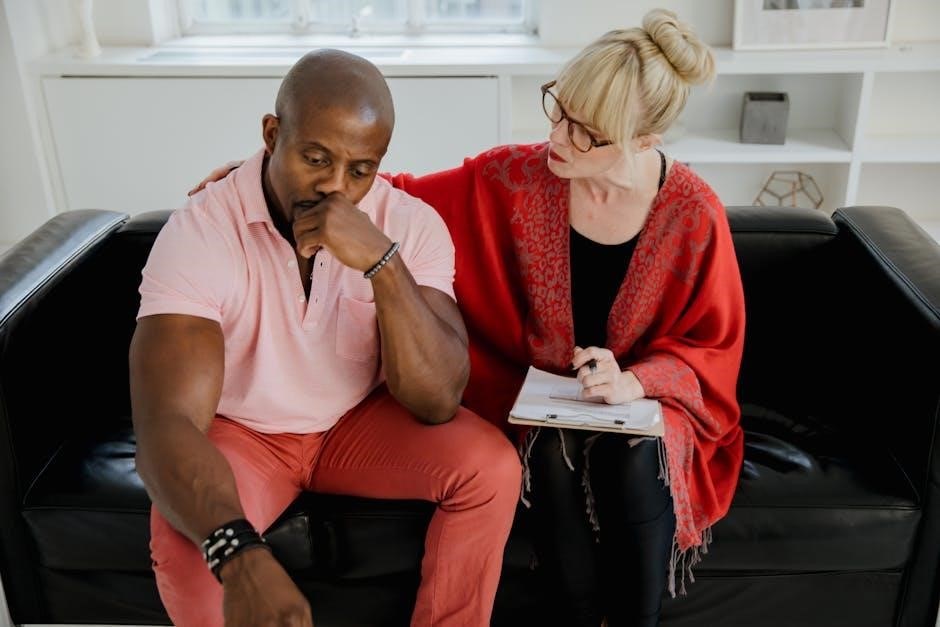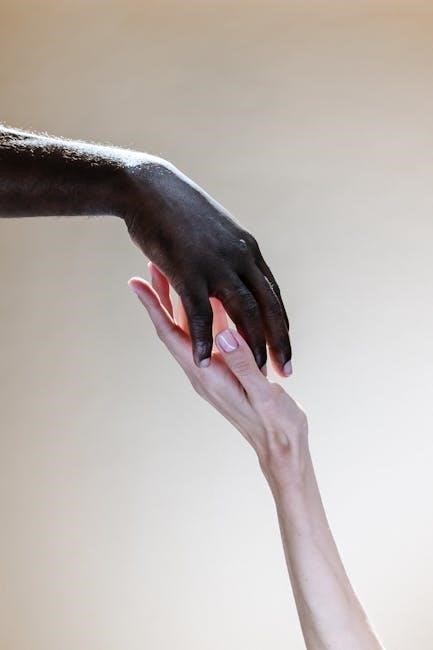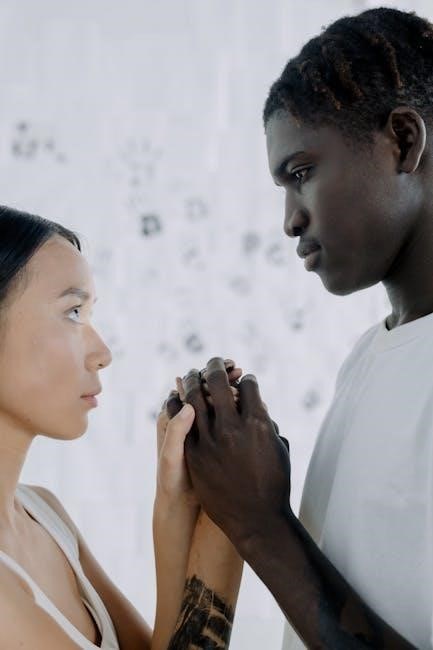This guide empowers Black men to understand the complexities of Black womanhood‚ fostering unity and respect. It navigates cultural nuances‚ socioeconomic challenges‚ and intergenerational trauma‚ offering tools for positive relationships and collective growth.
Purpose and Significance of the Guide
The guide serves as a vital tool for Black men to gain insight into the complexities of Black womanhood‚ fostering understanding and unity. It emphasizes recognizing toxic patterns and promotes harmony within relationships. By addressing cultural dynamics and historical impacts‚ the guide encourages mutual respect and empowerment‚ helping Black men and women build stronger‚ healthier connections rooted in awareness and appreciation of shared experiences and challenges.
Overview of the Book’s Content
The book provides a comprehensive analysis of Black womanhood‚ offering insights into cultural identity‚ societal roles‚ and relationship dynamics. It explores communication strategies‚ socioeconomic challenges‚ and intergenerational trauma‚ while emphasizing mutual respect and empowerment. The guide equips Black men with tools to navigate relationships effectively‚ fostering understanding and unity. By addressing both historical and contemporary issues‚ it aims to promote healing and strengthen connections within the Black community‚ encouraging personal and communal growth.
Understanding Black Womanhood
Black womanhood embodies strength‚ resilience‚ and cultural richness. It explores the vibrant identity‚ historical struggles‚ and societal roles of Black women‚ highlighting their unique experiences and challenges.
Historical Context and Cultural Identity
The legacy of slavery‚ Jim Crow‚ and systemic oppression has profoundly shaped the identity and experiences of Black women. Historical trauma‚ coupled with societal marginalization‚ has influenced their roles within families and communities. Understanding this context is crucial for appreciating the resilience and strength embedded in Black womanhood. Cultural identity‚ rooted in African heritage and the Black diaspora‚ plays a vital role in shaping their perspectives and contributions to society. Recognizing these historical and cultural dynamics fosters deeper empathy and unity.
The Role of Black Women in Society
Black women have historically been pillars of strength in their communities‚ assuming roles as caregivers‚ leaders‚ and advocates. They navigate societal expectations while challenging stereotypes‚ contributing significantly to education‚ arts‚ and activism. Their resilience in the face of systemic barriers underscores their vital role in fostering progress and unity. By understanding their multifaceted contributions‚ Black men can better appreciate their partners’ strengths and support their collective advancement‚ fostering harmony and mutual respect in relationships and society at large.

Communication and Relationship Dynamics
Open dialogue‚ mutual respect‚ and trust are essential for healthy relationships. Understanding each other’s perspectives fosters deeper connections‚ helping to bridge gaps and strengthen bonds between partners.
Breaking Down Barriers in Communication
Open dialogue and active listening are crucial for bridging gaps between Black men and women. Understanding cultural nuances and fostering empathy helps overcome misunderstandings. By addressing stereotypes and defense mechanisms‚ both partners can create a safe space for honest expression. This process strengthens trust and mutual respect‚ paving the way for healthier‚ more fulfilling relationships. Effective communication is key to navigating challenges and building a foundation of understanding and unity.
Strategies for Effective Dialogue
Effective dialogue begins with active listening and empathy‚ allowing both partners to express themselves without judgment. Understanding cultural nuances and historical contexts helps bridge gaps. Setting clear boundaries and fostering mutual respect creates a foundation for open communication. Encouraging vulnerability and addressing misunderstandings constructively strengthens trust. By prioritizing understanding over being right‚ Black men and women can navigate conflicts with clarity and compassion‚ fostering deeper connections and healthier relationships.
Socioeconomic Factors and Their Impact
Socioeconomic challenges disproportionately affect Black relationships‚ influencing financial stability‚ educational disparities‚ and career opportunities. Understanding these dynamics fosters empathy and strengthens partnerships within the community.
Economic Challenges and Their Effects on Relationships
Economic challenges create stress‚ affecting communication and trust in relationships. Financial instability often leads to frustration‚ straining bonds between Black men and women. Addressing these issues requires open dialogue and mutual support‚ fostering resilience. By understanding the root causes‚ such as systemic inequality‚ partners can work together to build stability and strengthen their connection.
Education and Career Dynamics
Education and career dynamics play a crucial role in understanding Black womanhood. Black women often pursue higher education and career goals‚ contributing to personal and communal growth. Their aspirations align with the broader goals of empowerment and self-determination within the Black community. Supporting each other’s educational and career pursuits fosters mutual respect and shared success‚ strengthening relationships and promoting unity. This mutual support is vital for overcoming societal challenges and achieving collective advancement.
Intergenerational Trauma and Healing
Understanding the legacy of historical trauma is vital for healing. It shapes Black relationships‚ requiring acknowledgment and collective efforts to break cycles and foster stronger‚ healthier relationships.
Legacy of Historical Trauma
The legacy of historical trauma deeply impacts Black relationships‚ rooted in slavery and systemic oppression. These experiences created generational pain‚ affecting trust and communication between Black men and women. The book highlights how unresolved trauma perpetuates dysfunction‚ emphasizing the need for acknowledgment and healing. By understanding this legacy‚ individuals can address its effects and work toward reconciliation‚ fostering healthier relationships and collective growth within the Black community.
Paths to Healing and Reconciliation
Healing and reconciliation require open dialogue‚ mutual respect‚ and a shared commitment to understanding. By addressing past wounds and fostering empathy‚ Black men and women can rebuild trust and strengthen bonds. The guide emphasizes the importance of cultural pride‚ self-awareness‚ and collective growth. Through these steps‚ individuals can move beyond trauma‚ creating a foundation for healthier‚ more fulfilling relationships and empowering their community as a whole.

Navigating Modern Relationships
Navigating modern relationships involves fostering trust‚ mutual respect‚ and open communication. It requires avoiding toxic patterns and embracing mutual growth for stronger‚ healthier connections.
Building Trust and Mutual Respect
Building trust and mutual respect is the cornerstone of any healthy relationship. It involves active listening‚ empathy‚ and acknowledging each other’s experiences. Trust fosters loyalty and commitment‚ while respect creates a foundation for open communication and understanding. By valuing each other’s perspectives and acknowledging past traumas‚ Black men and women can build connections rooted in sincerity and mutual growth‚ fostering an environment where both partners thrive individually and together.
Avoiding Toxic Relationship Patterns
Avoiding toxic relationship patterns requires recognizing red flags and addressing dysfunctional behaviors rooted in historical and cultural trauma. Open communication and mutual accountability are essential to break cycles of resentment and mistrust. By fostering empathy and understanding‚ Black men and women can navigate conflicts constructively‚ prioritizing unity and respect over destructive tendencies. This guide emphasizes the importance of identifying toxic behaviors early and fostering healthier‚ more supportive interactions that promote long-term harmony and growth.
Empowerment and Unity
Empowerment and unity are achieved through mutual understanding‚ respect‚ and collective efforts to uplift both Black men and women‚ fostering strength and resilience in the face of societal challenges.
Empowering Black Men and Women
Empowerment begins with mutual respect and understanding‚ fostering a foundation of trust and collaboration. By addressing stereotypes and promoting unity‚ both Black men and women can thrive‚ breaking cycles of dysfunction. This guide emphasizes the importance of shared growth‚ encouraging open dialogue and cultural appreciation. Empowerment is not about dominance but about collective strength‚ ensuring both genders can flourish together‚ creating a harmonious and supportive community rooted in respect and mutual upliftment.
Community Support and Collective Growth
Community support is vital for fostering unity and progress among Black men and women. By embracing shared values and cultural heritage‚ individuals can strengthen bonds and work collaboratively toward common goals. Educational initiatives and open forums provide platforms for dialogue‚ empowering both genders to grow together. Collective growth fosters resilience‚ enabling the community to overcome challenges and thrive; This shared journey creates a supportive environment where everyone can contribute to a brighter‚ more harmonious future for all.

Contemporary Issues and Representation
Modern media often portrays Black men and women through skewed lenses‚ influencing societal perceptions. Addressing these representations is crucial for fostering authentic understanding and equity in relationships.
Media Representation and Its Impact
Media often perpetuates stereotypes‚ influencing perceptions of Black men and women. Negative portrayals can distort self-view and relationships‚ reinforcing societal biases. Accurate representation is vital for fostering understanding and unity. The guide emphasizes the need to challenge harmful narratives and promote authentic‚ diverse storytelling. By addressing media’s role‚ Black men and women can reclaim their identities and build stronger‚ more equitable connections‚ free from external misinformation and biases.
Addressing Societal Perceptions
Societal perceptions often distort the dynamics between Black men and women‚ fueled by stereotypes rooted in historical oppression. These biases perpetuate division and mistrust‚ hindering unity. The guide challenges these narratives‚ urging Black men and women to recognize and overcome embedded biases. By fostering mutual understanding and respect‚ individuals can dismantle societal myths and strengthen their relationships. Education and dialogue are key to reclaiming authentic connections and empowering collective growth within the Black community.
This guide empowers Black men to foster mutual respect and understanding‚ promoting healing and unity. It emphasizes the importance of cultural awareness and collective growth.
Final Thoughts on the Guide
This guide serves as a powerful tool for fostering understanding and unity between Black men and women. By addressing historical trauma‚ cultural nuances‚ and modern challenges‚ it empowers individuals to build healthier relationships. Shahrazad Ali’s insights highlight the importance of mutual respect and communication‚ offering a pathway to healing and collective growth. The guide remains a vital resource for those seeking to strengthen Black families and communities‚ promoting a future rooted in unity and empowerment.
Reflecting on Personal and Communal Growth
This guide encourages Black men and women to embrace self-awareness and mutual understanding‚ fostering personal and communal growth. By addressing historical wounds and societal challenges‚ it promotes healing and unity. The journey toward empowerment requires acknowledging past traumas while building a future rooted in respect and collaboration; Through introspection and dialogue‚ individuals can strengthen their relationships and contribute to the collective upliftment of the Black community‚ creating a legacy of resilience and harmony for future generations.
